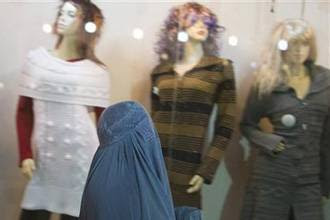TV stations pay little heed to Islamic regulations...YIKES.
Afghan govt failing to keep female flesh off TV
Ignoring restrictions
Ignoring restrictions
KABUL (Reuters)
Eight years after the fall of the Taliban, who banned television and barred women from appearing in public without an all-enveloping burqa, the Afghan government is fighting a losing battle to keep female flesh off TV.
In a country that remains deeply conservative and male-dominated, the government has the power to impose fines or shut down broadcasters for showing images of women deemed racy. Yet the guidelines seem to be observed largely in the breach.
" There were lots of complaints from the public, especially among families, that some of the TV stations were not observing Islamic cultural traditions, which they called harmful for the young generation "
Culture MinisterSayed Makhdoom Raheen, Urban Afghans are now spoiled for choice with a remarkably vibrant array of TV stations. At any given moment, viewers can flip between news, cooking shows, cartoons, Turkish soap operas, Iranian dramas and hugely popular Indian films, with their gyrating sari-clad heroines.
To get around government restrictions on showing female flesh, TV stations employ full-time pixilators, charged with adding blurry blotches over bare arms, legs, necklines and midriffs. But if you watch long enough, you can easily spot a swaying elbow, a naked ankle or even an exposed strip of waist.
The new information and culture minister, Sayed Makhdoom Raheen, summoned the heads of some 20 private broadcasters and cable operators last month, demanding they revise their programs and follow government restrictions.
"I told them that in addition to your personal interests ... you should not forget your social and Islamic obligations and act responsibly with regard to the morals of the new generation," Raheen told Reuters in an interview.
"There were lots of complaints from the public, especially among families, that some of the TV stations were not observing Islamic cultural traditions, which they called harmful for the young generation."
"It is a serious matter for us. The ministry believes in raising and discussing the issue through understanding, and if that does not succeed, then steps will be taken under the law."
Ignoring restrictions
Some TV stations appear to have abided by such restrictions only for a few days. Cable operators, which reach a small share of households, seem to pay the guidelines little heed at all.
Female lawmaker Fawzia Kufi caused a hush followed by laughter among a group of parliamentarians last month when she interrupted a debate on banning female dancing on TV with the suggestion that authorities also ban racy images of men.
Still, the work of the pixilators goes on. Saad Mohseni, Director of Tolo TV, Afghanistan's biggest private TV network which mixes original programming and popular imported fare, said his station has an entire pixilation department.
"They pixilate many things, including 'too much flesh' and any thing (that) may contravene our religious, cultural and social norms," he said in an e-mailed response to questions.
"It naturally makes things a bit more complicated, but we accept that we need to have this procedure in place for Afghanistan."
Eight years after the fall of the Taliban, who banned television and barred women from appearing in public without an all-enveloping burqa, the Afghan government is fighting a losing battle to keep female flesh off TV.
In a country that remains deeply conservative and male-dominated, the government has the power to impose fines or shut down broadcasters for showing images of women deemed racy. Yet the guidelines seem to be observed largely in the breach.
" There were lots of complaints from the public, especially among families, that some of the TV stations were not observing Islamic cultural traditions, which they called harmful for the young generation "
Culture MinisterSayed Makhdoom Raheen, Urban Afghans are now spoiled for choice with a remarkably vibrant array of TV stations. At any given moment, viewers can flip between news, cooking shows, cartoons, Turkish soap operas, Iranian dramas and hugely popular Indian films, with their gyrating sari-clad heroines.
To get around government restrictions on showing female flesh, TV stations employ full-time pixilators, charged with adding blurry blotches over bare arms, legs, necklines and midriffs. But if you watch long enough, you can easily spot a swaying elbow, a naked ankle or even an exposed strip of waist.
The new information and culture minister, Sayed Makhdoom Raheen, summoned the heads of some 20 private broadcasters and cable operators last month, demanding they revise their programs and follow government restrictions.
"I told them that in addition to your personal interests ... you should not forget your social and Islamic obligations and act responsibly with regard to the morals of the new generation," Raheen told Reuters in an interview.
"There were lots of complaints from the public, especially among families, that some of the TV stations were not observing Islamic cultural traditions, which they called harmful for the young generation."
"It is a serious matter for us. The ministry believes in raising and discussing the issue through understanding, and if that does not succeed, then steps will be taken under the law."
Ignoring restrictions
Some TV stations appear to have abided by such restrictions only for a few days. Cable operators, which reach a small share of households, seem to pay the guidelines little heed at all.
Female lawmaker Fawzia Kufi caused a hush followed by laughter among a group of parliamentarians last month when she interrupted a debate on banning female dancing on TV with the suggestion that authorities also ban racy images of men.
Still, the work of the pixilators goes on. Saad Mohseni, Director of Tolo TV, Afghanistan's biggest private TV network which mixes original programming and popular imported fare, said his station has an entire pixilation department.
"They pixilate many things, including 'too much flesh' and any thing (that) may contravene our religious, cultural and social norms," he said in an e-mailed response to questions.
"It naturally makes things a bit more complicated, but we accept that we need to have this procedure in place for Afghanistan."


Comments